First Global Age - Beginnings
| AP Psychology | Current Events | Resource Room (SETSS) |
|---|---|---|
| Period 1 | Periods 3 & 5 | Period 8 |
| Mr. Ott | Mr. Ott | Mr. Ott |
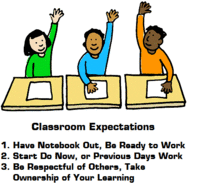

Marking Period 5 - 3/16/20 to 5/1/20 - Reminders
MP 5 Assignment
Marking Period Assignments
1. Choose Three (3) Articles from the list of articles under the Spring Semester for MP4, MP5, MP6.
2. Read each article and complete the questions that follow in the Google Assignment Form.
3. All answers must be electronic. You can print out and answer the questions on paper, but all responses must be entered in the Google Assignment Form for credit.
4. Marking Period Assignment Articles must be completed by 04/23/2020. The following is a list of articles that you must complete for the Marking Period Assignment.
5. Marking Period Assignment - Due 04/23/2020
- Note: By the end of Marking Period 6, you must have nine (9) completed Articles.
CourseWorksPlus Assignments
- Russian Revolution (Workbook) - Due 3/15/20
- Communism in the Soviet Union Under Stalin - Due 3/22/20
- Fascism in Germany Under Hitler - Due 3/22/20
- Fascism in Italy Under Mussolini - Due 3/22/20
- The Holocaust (Workbook) - Due 3/24/20
- World War II - European Theatre - Part 1 (Workbook) - Due 3/26/20
- World War II - Pacific Theatre - Part 2 (Workbook) - Due 3/28/20
- World War II - Allied Victory - Part 3 - (Workbook) - Due 3/30/20
- Cold War Part 1 - Superpowers Faceoff (Workbook) - Due 4/2/20
- Cold War Part 2 - Wars in Korea & Vietnam (Workbook) - Due 4/4/20
- Cold War Part 3 - The Cold War Divides the World (Workbook) - Due 4/6/20
- Cold War Part 4 - The Cold War Thaws (Workbook) - Due 4/8/20
- Decolonization - The Indian Subcontinent Achieves Freedom (Workbook) - Due 4/24/20
- Decolonization - SE Asia Nations Gain Independence (Workbook) - Due 4/26/20
- Decolonization - New Nations in Africa (Workbook) - Due 4/28/20
- Communism in China (Workbook) - Due 4/30/20
Other Assignments
Quizzes & Exams
Aim: Evaluate the name given to the Renaissance time of exploration and trade?
Do Now: Name the four important turning points that allowed the First Global Age (AKA: Age of Discovery, Age of Exploration, The Encounter) to occur.
Lesson Overview:
| Item | Approx Time |
| Do Now | 3-5 Min |
| Mini Lesson | 15-20 Min |
| Activity | 15 Min |
| Discussion | 5-7 Min |
Background
The resurgence of trade following the Middle Ages in Europe resulted in a demand for goods from Asia. Trade routes were established across the Mediterranean and through the Middle East to handle this need. But, when the expansion of the Ottoman Empire caused disruption along these routes, Europeans were forced to seek alternative ways of importing these goods. This led to the exploration of water routes to Asia, and eventually the discovery of the Americas by the Europeans.
Exploration for Trade
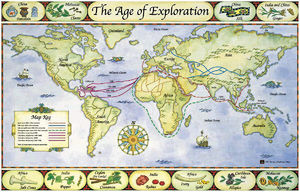
Exploration
In the early 1400s, Europeans began exploring the west coast of Africa in search of an all water route to Asia. These early explorations were led by the Portuguese. In 1488, Bartholomeu Dias rounded the Cape of Good Hope at the southern tip of Africa. In 1498, Vasco Da Gama established an all water route to India. The success of these explorations led Spain to begin its own voyages. In 1492, Christopher Columbus crossed the Atlantic Ocean and discovered the Americas for Spain. These discoveries had a lasting impact on Europe, Asia, Africa and the Americas.
Development of Colonies
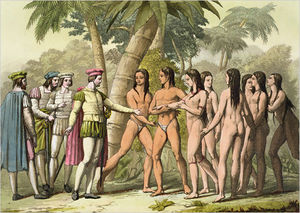
Imperialism
European nations competed for colonies across the globe. These colonies were exploited for their raw materials, and used as new markets for European goods. Europeans had little regard for most of the indigenous peoples of these areas, and as a result, there was great loss of life and culture. Also, because of the need for a reliable labor source, slaves were transported from Africa to the Americas in large numbers.
The Columbian Exchange
Columbian Exchange
The Age of Exploration is a turning point in history because it altered the way people lived across the world. The biggest aspect of this change deals with the exchange of people, plants, animals, ideas, and technology. This is known as the Columbian Exchange, because it starts with Columbus. While many aspects of this exchange had positive effects, such as the exchange of foods between Europe and America, there were also negative effects, such as the exchange of diseases between Europe and America.
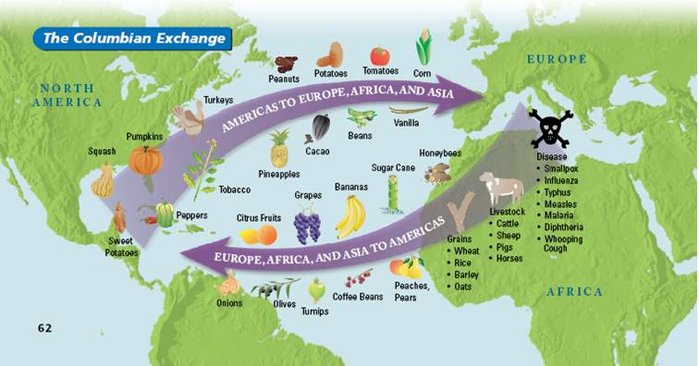
| From Europe to the New World | From the New World to Europe |
|---|---|
|
|
Technology for Exploration
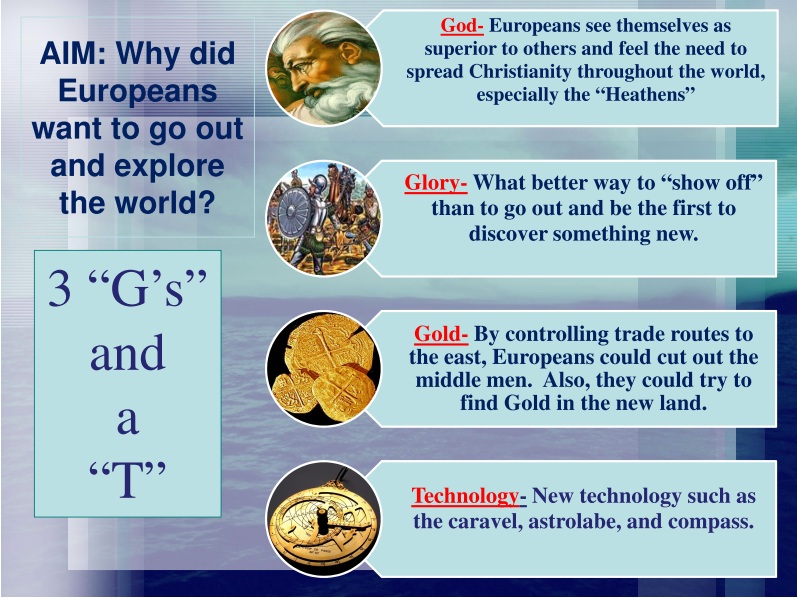
The Explorers
| Date | Explorer | Nationality | Achievement |
| Around 1000 | Leif Ericson | Norse | First European to reach North American Mainland |
| 1271-1295 | Marco Polo | Italian | Traveled to the Far East, to what was known then as Cathay or China-Made men want to travel there through his book |
| 1394-1460 | Prince Henry | Portuguese | Created navigation school in Sagres, Portugal Explored the western African coastline |
| 1487-1488 | Bartholomeu Dias | Portuguese | First European to round the Cape of Good Hope |
| 1492-1504 | Christopher Columbus | Italian | Made 4 voyages to "The New World" - West Indies and Caribbean Islands |
| 1497-1503 | Amerigo Vespucci | Italian | Sailed to West Indies and South America (the Americas are named after him) |
| 1497-1498 | John Cabot | Italian | Explored the shores of Newfoundland, Nova Scotia, and Labrador |
| 1498 | Vasco Da Gama | Portuguese | First to travel to West Indies around Africa |
| 1513 | Vasco de Balboa | Spanish | Led expedition across Panama and found the Pacific Ocean |
| 1513 | Juan Ponce de Leon | Spanish | Explored Florida looking for the Fountain of Youth |
| 1520-1521 | Ferdinand Magellan | Portuguese | Commanded first globe circling voyage |
| 1519-1521 | Hernando Cortez | Spanish | Conquered Aztecs in Mexico |
| 1523 | Giovanni da Verranzano | Italian | Searched for a Northwest Passage |
| 1523-1535 | Francisco Pizarro | Spanish | Conquered Peru and the Inca Civilization |
| 1534-1542 | Jacques Cartier | French | Traveled St. Lawrence River |
| 1539-1541 | Hernando De Soto | Spanish | Explored American Southeast-Discovered the Mississippi River |
| 1540-1542 | Francisco Vazquez de Coronado | Spanish | Explored American Southwest |
| 1577-1580 | Sir Frances Drake | English | First English to sail around the world-Defeated the Spanish Armada- Claimed California for England |
| 1603-1616 | Samuel de Champlain | French | Explored eastern coast of North America and the coast of the St. Lawrence River to Lake Huron-Reached Lake Champlain |
| 1609-1611 | Henry Hudson | English | Explored Hudson Bay, Hudson River, and Hudson Strait |
| 1672 | Father Marquette and Louis Joliet | French | Explored Northern Mississippi River |
| 1682 | Robert LaSalle | French | Traveled to the mouth of the Mississippi River and claimed it for France |
Results of the Age of Exploration
Results:
The Age of Discovery & Exploration changed the world. Access to new and better foods allowed the European population to grow, and access to the New World gave these people a place to go. New World civilizations such as the Inca and Aztecs, faced near total destruction of their cultures either through disease brought by the Europeans, or by colonization. Africa faced a diaspora, or forced movement of its people, as slavery became the dominant labor force in the Americas. The Age of Exploration was both a positive and negative experience for many civilizations.
Classwork & Homework
Lesson PowerPoint: Age of Exploration/First Global Age
Classwork:
/wiki/images/f/f6/Explorationtechactivity.pdf Age of Exploration Activity Worksheet]
Homework: Assignments